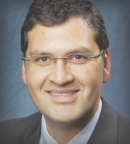Based on early results in clinical trials, interest in the use of chimeric antigen receptor (CAR) T-cell therapy in multiple myeloma has been high, especially for products targeting B-cell maturation antigen (BCMA). During the ASCO20 Virtual Scientific Program, further support for CAR T-cell therapy came from two key studies of anti-BCMA CAR T-cell therapy: the phase II KarMMa trial of idecabtagene vicleucel1 and the phase Ib/II CARTITUDE-1 trial of JNJ-4528.2
Outcomes for patients with triple-exposed relapsed or refractory multiple myeloma have been poor, with deep and durable responses infrequently achieved, and median progression-free survival of only 3 to 4 months, investigators pointed out in their presentations. Ajay K. Nooka, MD, MPH, Associate Professor, Division of Bone Marrow Transplant, at Winship Cancer Institute, Emory University, commented on the challenge of treating these patients.

Ajay K. Nooka, MD, MPH
“Among patients with relapsed or refractory myeloma who have been exposed to immunomodulatory drugs, proteasome inhibitors, anti-CD38 antibodies, and have received multiple lines of therapy, there are no standard-of-care options. Often, the choice of treatment we offer is based on the availability of the utmost efficacious agent,” Dr. Nooka said.
“Availing the best option to gain the best depth of response and improving progression-free survival are the keys to gaining a long-term survival advantage. The early results of currently available BCMA-targeted therapies—in the form of CAR T-therapies, antibody-drug conjugates, and bispecific T-cell engagers—seem apt and promising in this space.”
KarMMa Details
Idecabtagene vicleucel (bb2121) induced responses in nearly three-fourths of patients with highly challenging disease, according to findings reported by Nikhil C. Munshi, MD, of the Jerome Lipper Multiple Myeloma Center, Dana-Farber Cancer Institute, and Harvard Medical School.1
“Idecabtagene vicleucel demonstrated frequent, deep, and durable responses in patients with heavily pretreated, highly refractory, relapsed myeloma. Both primary and secondary endpoints were met, with overall responses in 73% of patients and complete responses in 33%,” Dr. Munshi reported.

Nikhil C. Munshi, MD
In March 2020, the co-developers of idecabtagene vicleucel, submitted a biologics license application to the U.S. Food and Drug Administration (FDA) for the use of idecabtagene vicleucel after at least three prior therapies, including an immunomodulatory drug, a proteasome inhibitor, and an anti-CD38 antibody. The FDA has asked for additional information.
The global KarMMa trial enrolled 158 patients with at least three prior therapies, of whom 140 underwent leukapheresis and 128 were treated at dose levels ranging from 150 to 450 × 106 CAR-positive T cells. Patients were followed for a median of 12 to 18 months.
The study population had received a median of six prior regimens; the majority had a high tumor burden, one-third had extramedullary disease, and one-third had high-risk cytogenetics. Of note, 88% of patients required bridging therapy during the CAR T-cell manufacturing process, “suggesting an aggressive nature of the disease for the patients who entered this study,” Dr. Munshi said.
Treatment Outcomes
The study’s primary endpoint was overall response (with a null hypothesis of < 50%), and the secondary endpoint was complete response (with a null hypothesis of < 10%). At a median follow-up of 13.3 months across all dose levels, KarMMa met both endpoints, with an overall response rate of 73% (P < .0001) and a complete response rate of 33% (P < .0001). At the target dose of 450 million cells, response rates rose to 82%, with complete responses achieved by 39% of patients. Clinically meaningful efficacy was observed across subgroups.
Minimal residual disease (MRD) negativity was achieved by 26% of complete responders and by 39% of patients with a very good partial response or better. In the highest-dose cohort, MRD negativity was seen in 28% and 48%, respectively.
The median duration of response was 10.7 months, extending to 19.0 months in complete responders. Median progression-free survival was 8.8 months, increasing to 12.1 months in the 450-million-cell cohort. “Progression-free survival also increased with the depth of response, the median being 20.2 months in patients achieving a complete or stringent complete response,” Dr. Munshi added.
In contrast, for nonresponders, disease progression occurred in less than 2 months, probably due to “the aggressive nature of the disease in patients entered on this study,” he said.
Median overall survival, although immature, was 19.4 months, with 78% of patients alive at 12 months.
No Unexpected Safety Findings
Safety data were consistent with previous studies of this product. Most patients (84%) developed some degree of cytokine-release syndrome (96% at the highest dose), 78% of which were low grade. For six patients, these events were grade 3 or 4; one patient died. Neurotoxicity developed in 18%, mostly low grade as well.
Cytopenias grade ≥ 3 were common, but the average patient recovered within 3 months. Infections were also common and were not thought to be dose-related.
There were five deaths overall within 8 weeks of idecabtagene vicleucel infusion: two following disease progression and three from adverse events (cytokine-release syndrome, Aspergillus pneumonia, and gastrointestinal hemorrhage). Another death, caused by cytomegalovirus-related pneumonia, occurred within 6 months in the absence of myeloma progression, Dr. Munshi reported.
“These results support a favorable benefit-to-risk profile for idecabtagene vicleucel across the dose range of 150 to 450 million cells,” Dr. Munshi concluded. “Overall, idecabtagene vicleucel provides an attractive option for the treatment of triple-class–exposed multiple myeloma.”
Idecabtagene vicleucel is being investigated as an earlier line of treatment for multiple myeloma in KarMMa-2, KarMMa-3, and KarMMa-4 in newly diagnosed patients.
CARTITUDE-1 Update
In updated results of the phase Ib/II CARTITUDE-1 trial, with a median follow-up of 11.5 months, 100% of patients with relapsed or refractory myeloma responded to treatment with JNJ-4528.2
“These responses were early, deep, and durable at a low dose of CAR T cells, with 22 of 29 patients alive and progression-free…. Cytokine-release syndrome was manageable in most patients, with a median onset of 6 days, suggesting outpatient dosing of JNJ-4528 may be feasible,” said Jesus G. Berdeja, MD, of Sarah Cannon Cancer Institute, Nashville.

Jesus G. Berdeja, MD
JNJ-68284528 (JNJ-4528) contains a 4-1BB co-stimulatory domain and two proteins that attach to BCMA to confer avidity. It is identical to the CAR T-cell construct LCAR-B38M, which also showed activity in the Chinese LEGEND-2 study, reported at the 2019 American Society of Hematology (ASH) Annual Meeting & Exposition.3
Based on initial findings from CARTITUDE-1, JNJ-4528 received Breakthrough Therapy designation by the FDA for the treatment of patients with relapsed or refractory multiple myeloma.
At the ASCO20 Virtual Scientific Program, Dr. Berdeja presented the results for 29 patients who have now been followed for a median of 11.5 months, more than 5 months longer than the first report at the 2019 ASH Annual Meeting & Exposition.4 According to the new data, early encouraging results have held up.
Patients had received a median of five prior lines of therapy (range, 3–18 lines). As prior treatment, 86% had undergone an autologous transplant; 100% were triple-exposed and 86% were refractory to three standard treatments; 76% were pentaexposed and 31% were refractory to five agents. After lymphodepletion, the patients received a single infusion of the JNJ-4528 CAR T cells at a targeted dose of 0.75 × 106 CAR-positive cells/kg.
The objective response rate was 100%, with stringent complete responses achieved by 86% and at least a very good partial response in 97%. “Response rate and depth of response were independent of BCMA expression at baseline,” Dr. Berdeja noted.
In the initial analysis reported at the 2019 ASH Annual Meeting & Exposition, 100% of patients were MRD-negative, and “the majority” continue to show an MRD-negative response by day 28, he said. Of 16 complete responsers whose MRD status was tested, 13 (81%) were MRD-negative at 10-5 or 10-6 and 69% were MRD-negative at 10-6 level. At 9 months, 86% of patients were progression-free.
There were three deaths on study: one from cytokine-release syndrome, one from acute myeloid leukemia (unrelated to treatment), and one from progressive disease.
DISCLOSURE: KarMMa was funded by Karyopharm Therapeutics. CARTITUDE-1 was funded by Janssen Research & Development. Dr. Nooka has received consulting fees from Amgen, Bristol-Myers Squibb, Sanofi, GlaxoSmithKline, Janssen Oncology, Karyopharm Therapeutics, Oncopeptides, Adaptive, and Takeda. Dr. Munshi holds stock or other ownership interests in OncoPep; serves as a consultant or advisor to AbbVie, Adaptive Biotechnologies, Amgen, BeiGene, Bristol Myers Squibb, Celgene, Janssen, Karyopharm Therapeutics, OncoPep, and Takeda; and holds intellectual property in OncoPep. Dr. Berdeja has served as an institutional consultant or advisor to Amgen, BioClinica, Bristol Myers Squibb, Celgene, CRISPR Therapeutics, Janssen, Karyopharm Therapeutics, Kite Pharma, Legend Biotech, Prothena, SecuraBio, Servier, and Takeda; and has received institutional research funding from AbbVie, Acetylon, Amgen, Bluebird Bio, Bristol Myers Squibb, Celgene, Cellularity, Constellation, CRISPR Therapeutics, Curis, Genentech/Roche, Glenmark, Janssen, Kesios, Lilly, Novartis, Poseida Therapeutics, Sanofi, Takeda, Teva, and Vivolux.
REFERENCES
1. Munshi NC, Anderson Jr LD, Shah N, et al: Idecabtagene vicleucel, a BCMA-targeted CAR T-cell therapy, in patients with relapsed and refractory multiple myeloma: Initial KarMMa results. ASCO20 Virtual Scientific Program. Abstract 8503.
2. Berdeja JG, Madduri D, Usmani SZ, et al: Update of CARTITUDE-1: A phase Ib/II study of JNJ-4528, a B-cell maturation antigen-directed CAR-T-cell therapy, in relapsed/refractory multiple myeloma. ASCO20 Virtual Scientific Program. Abstract 8505.
3. Wang BY, Zhao WH, Liu J, et al: Long-term follow-up of a phase I, first-in-human open-label study of LCAR-B38M, a structurally differentiated chimeric antigen receptor T cell therapy targeting B-cell maturation antigen, in patients with relapsed/refractory multiple myeloma. 2019 ASH Annual Meeting & Exposition. Abstract 579. Presented December 9, 2010.
4. Madduri D, Usmani SZ, Jagannath S, et al: Results from CARTITUDE-1: A phase Ib/II study of JNJ-4528, a CAR-T cell therapy directed against B-cell maturation antigen, in patients with relapsed and/or refractory multiple myeloma. 2019 ASH Annual Meeting & Exposition. Abstract 577. Presented December 9, 2019.

